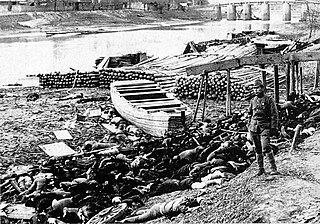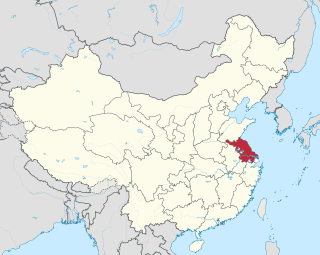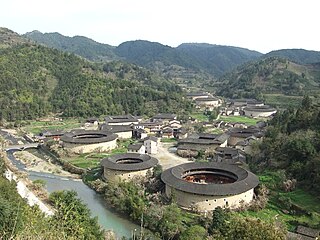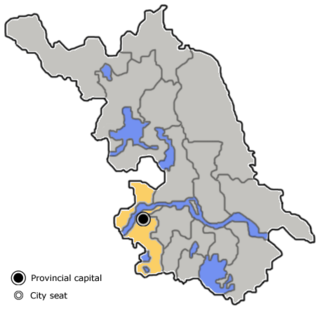
The Nanjing Massacre, or Rape of Nanjing, was an episode of mass murder and mass rape committed by Japanese troops against the residents of Nanjing (Nanking), then the capital of the Republic of China, during the Second Sino-Japanese War. In the Postal romanization system used at the time, the city's name was transliterated as "Nanking", and the event called the Nanking Massacre or Rape of Nanking.

Jiangsu is an eastern-central coastal province of the People's Republic of China. It is one of the leading provinces in finance, education, technology, and tourism, with its capital in Nanjing. Jiangsu is the third smallest, but the fifth most populous and the most densely populated of the 23 provinces of the People's Republic of China. Jiangsu has the highest GDP per capita of Chinese provinces and second-highest GDP of Chinese provinces, after Guangdong. Jiangsu borders Shandong in the north, Anhui to the west, and Zhejiang and Shanghai to the south. Jiangsu has a coastline of over 1,000 kilometres (620 mi) along the Yellow Sea, and the Yangtze River passes through the southern part of the province.

Zhili, formerly romanized as Chihli, was a northern province of China from the 14th-century Ming Dynasty until the region was dissolved in 1911 and converted as a province and renamed as Hebei in 1928.

Nanjing Normal University is a normal university in Nanjing, Jiangsu province, China. Located in the ancient capital of six dynasties in Chinese history, Nanjing Normal University is one of the national key universities of "Project 211" under the supervision of the Ministry of Education and Jiangsu Provincial Government. It is a Chinese Ministry of Education Double First Class Discipline University, with Double First Class status in certain disciplines. The International Research And Training Centre For Rural Education is affiliated with the university's Education Faculty.

Chuzhou is a prefecture-level city in eastern Anhui Province, China. It borders the provincial capital of Hefei to the south and southwest, Huainan to the west, Bengbu to the northwest, and the province of Jiangsu to the east. According to the 2010 Census, the city of Chuzhou has a registered population of 3,937,868 inhabitants, whom 994,342 lived in the built-up area made of 2 urban districts and now Lai'an county largely being urbanized. Nevertheless, 7,260,240 persons declared to be permanent residents.. Its proximity to Nanjing and the building of a 54.4 km Metro line till Nanjing North station is transforming the city in a new Nanjing outer suburb.

The Nanjing Yangtze River Bridge is a double-decked road-rail truss bridge across the Yangtze River between Pukou and Xiaguan in Nanjing, China. Its upper deck is part of China National Highway 104, spanning 4,588 metres (15,052 ft). Its lower deck, with a double-track railway, is 6,772 metres (22,218 ft) long, and completes the Beijing-Shanghai Railway, which had been divided by the Yangtze for decades. Its right bridge consists of nine piers, with the maximum span of 160 metres (525 ft) and the total length of 1,576 metres (5,171 ft). The bridge carries approximately 80,000 vehicles and 190 trains per day.

Nanjing Automobile is a state-owned enterprise with a history that dates from 1947, making it the oldest of the Chinese automobile manufacturers although the comparatively younger FAW Automotive was the first to actually make cars.

The Nanjing Metro is a rapid transit system serving the urban and suburban districts of Nanjing, the capital city of Jiangsu Province in the People's Republic of China. The system has ten lines and 159 stations running on 393.628 km (244.589 mi) of track. It is operated and maintained by the Nanjing Metro Group Company. The total length of the system ranks fourth in China, after Shanghai, Beijing and Guangzhou. In 2017, the metro system carried a total of 977.4 million annual riders.

The People's Liberation Army uses a system of theater commands, of which there are now five:

Yizheng is a county-level city under the administration of the prefecture-level city of Yangzhou, Jiangsu province, China, with a population of about 600,000 (2007). It borders the prefecture-level divisions of Chuzhou (Anhui) to the north, Nanjing to the west, and Zhenjiang to the south.
The Treaty of the Bogue was a treaty between China and the United Kingdom, concluded in October 1843 to supplement the previous Treaty of Nanking. The treaty's key provisions granted extraterritoriality and most favored nation status to Britain.

The 2014 Summer Youth Olympic Games, officially known as II Summer Youth Olympic Games, were the second Summer Youth Olympic Games, an international sports, education and cultural festival for teenagers, held from 16 to 28 August 2014 in Nanjing, China. These were the second Olympic Games held in China after the 2008 Summer Olympics in Beijing.

Nanjing County is a county under the administration of Zhangzhou City, in the south of Fujian province, People's Republic of China.

Nanjing railway station is a major railway station of Nanjing, the capital of Jiangsu province. It is located in the northern part of Nanjing's urban core, near Xuanwu Lake.

Changzhou railway station is a railway station of Jinghu railway and Shanghai-Nanjing Intercity Railway.The station located Changzhou, Jiangsu, China. Roughly there are 350 trains stop here each day.

Nanjing University, known as Nanda, is a major public university, the oldest institution of higher learning in Nanjing, Jiangsu, and a member of the elite C9 League of Chinese universities.

The Qinhuai River (秦淮河) is a tributary of the Yangtze with a total length of 110 km. It flows through central Nanjing and is called "Nanjing's mother river". It is the "life blood" of the city. The Qinhuai River is divided into inner and outer rivers.
Athletics at the 2014 Summer Youth Olympics was held from 20 to 26 August at the Nanjing Olympic Sports Center in Nanjing, China.
The 2017 FIRS Women's Roller Hockey World Cup was the 14th edition of the Women's Roller Hockey World Cup, organised by the Fédération Internationale de Roller Sports (FIRS). The tournament was held for the first time in China, in the city of Nanjing, from 27 August to 2 September 2017, as part of the 2017 World Roller Games.

















